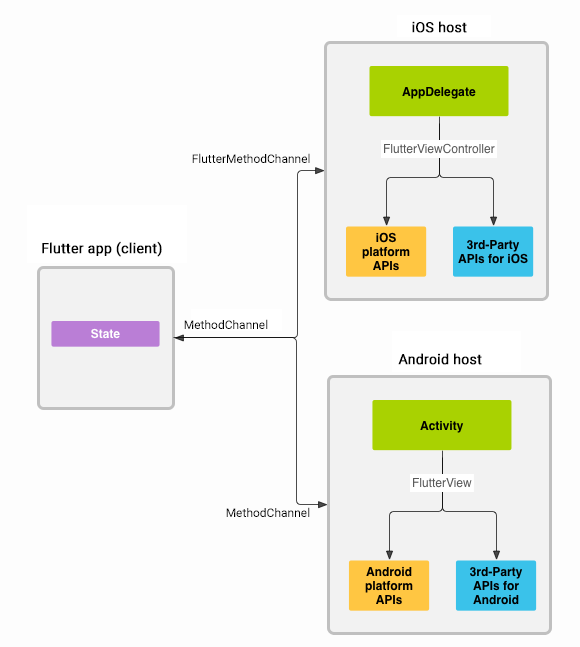Google's ML Kit for Flutter is a set of Flutter plugins that enable Flutter apps to use Google's standalone ML Kit.
| Feature | Plugin | Source Code | Android | iOS |
|---|---|---|---|---|
| Language Identification | google_mlkit_language_id  |
 |
✅ | ✅ |
| On-Device Translation | google_mlkit_translation  |
 |
✅ | ✅ |
| Smart Reply | google_mlkit_smart_reply  |
 |
✅ | ✅ |
| Entity Extraction | google_mlkit_entity_extraction  |
 |
✅ | ✅ |
PLEASE READ THIS before continuing or posting a new issue:
-
Google's ML Kit was build only for mobile platforms: iOS and Android apps.
-
This plugin is not sponsor or maintained by Google. The authors are developers excited about machine learning that wanted to expose Google's native APIs to Flutter.
-
Google's ML Kit APIs are ony developed natively for iOS and Android. This plugin uses Flutter Platform Channels as explained here.
Messages are passed between the client (the app/plugin) and host (platform) using platform channels as illustrated in this diagram:
Messages and responses are passed asynchronously, to ensure the user interface remains responsive. To read more about platform channels go here.
Because this plugin uses platform channels, no Machine Learning processing is done in Flutter/Dart, all the calls are passed to the native platform using
MethodChannelin Android andFlutterMethodChannelin iOS, and executed using the Google's native APIs. Think of this plugin as a bridge between your app and Google's native ML Kit APIs. This plugin only passes the call to the native API and the processing is done by Google's API. It is important that you understand this concept when it comes to debugging errors for your ML model and/or app. -
Since the plugin uses platform channels, you may encounter issues with the native API. Before submitting a new issue, identify the source of the issue. You can run both iOS and/or Android native example apps by Google and make sure that the issue is not reproducible with their native examples. If you can reproduce the issue in their apps then report the issue to Google. The authors do not have access to the source code of their native APIs, so you need to report the issue to them. If you find that their example apps are okay and still you have an issue using this plugin, then look at our closed and open issues. If you cannot find anything that can help you then report the issue and provide enough details. Be patient, someone from the community will eventually help you.
- Minimum iOS Deployment Target: 10.0
- Xcode 13 or newer
- Swift 5
- ML Kit only supports 64-bit architectures (x86_64 and arm64). Check this list to see if your device has the required device capabilities. More info here.
Since ML Kit does not support 32-bit architectures (i386 and armv7), you need to exclude armv7 architectures in Xcode in order to run flutter build ios or flutter build ipa. More info here.
Go to Project > Runner > Building Settings > Excluded Architectures > Any SDK > armv7
Then your Podfile should look like this:
# add this line:
$iOSVersion = '10.0'
post_install do |installer|
# add these lines:
installer.pods_project.build_configurations.each do |config|
config.build_settings["EXCLUDED_ARCHS[sdk=*]"] = "armv7"
config.build_settings['IPHONEOS_DEPLOYMENT_TARGET'] = $iOSVersion
end
installer.pods_project.targets.each do |target|
flutter_additional_ios_build_settings(target)
# add these lines:
target.build_configurations.each do |config|
if Gem::Version.new($iOSVersion) > Gem::Version.new(config.build_settings['IPHONEOS_DEPLOYMENT_TARGET'])
config.build_settings['IPHONEOS_DEPLOYMENT_TARGET'] = $iOSVersion
end
end
end
endNotice that the minimum IPHONEOS_DEPLOYMENT_TARGET is 10.0, you can set it to something newer but not older.
- minSdkVersion: 21
- targetSdkVersion: 31
- compileSdkVersion: 31
When Migrating from ML Kit for Firebase read this guide.
For Android details read this.
For iOS details read this.
Google's standalone ML Kit library does have any direct dependency with Firebase. As designed by Google, you do not need to include Firebase in your project in order to use ML Kit. However, some ML Kit APIs have the possibility to be used with Custom Models, that means that the default models can be replaced with custom TensorFlow Lite models.
The plugins that allow Custom Models are:
To use custom models hosted in firebase in iOS, you have to update your app's Podfile.
First, include GoogleMLKit/LinkFirebase and Firebase in your Podfile:
platform :ios, '10.0'
...
# Enable firebase-hosted models #
pod 'GoogleMLKit/LinkFirebase'
pod 'Firebase'Next, add the preprocessor flag to enable the firebase remote models at compile time. To do that, update your existing build_configurations loop in the post_install step with the following:
post_install do |installer|
installer.pods_project.targets.each do |target|
... # Here are some configurations automatically generated by flutter
target.build_configurations.each do |config|
# Enable firebase-hosted ML models
config.build_settings['GCC_PREPROCESSOR_DEFINITIONS'] ||= [
'$(inherited)',
'MLKIT_FIREBASE_MODELS=1',
]
end
end
endTo setup Firebase for your project check this links:
Also please note that in latest versions, google_ml_kit has become an umbrella plugin including all the plugin listed in Features. For that reason you will need to configure Firebase in your project if using google_ml_kit. We recommend you start using the plugins listed in Features rather than using google_ml_kit, otherwise you will be including unnecessary dependencies in your project.
Find the example app here.
Contributions are welcome. In case of any problems look at existing issues, if you cannot find anything related to your problem then open an issue. Create an issue before opening a pull request for non trivial fixes. In case of trivial fixes open a pull request directly.









